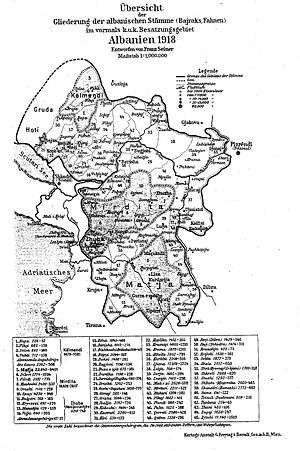Gashi (tribe)

Gashi is an Albanian surname, the name of one of the major historical tribes from northern Albania and historical tribal region situated in the District of Tropojë[1][2]
History
Legends and oral tradition about origins
According to tradition, the Toplana, Shllaku as well as the Gashi can trace their lineage back to 1450 when they arrived from Vasojevići, a Serb tribe in Montenegro, to Albania.[3] According to tradition, recorded by Nopcsa, the ancestor of Shllaku was named "Can Gabeti", one of four brothers (the others were the founder of the Gashi, Toplana and Megulla).[4] Gabeti, said to have been an Orthodox Christian from Montenegro, came across the original native population who were the ancestors of the Kolë Pep Fura family and whose last male descendant died about 1900.[5]
Scholarly theories about the origin
According to Nopsca, the first mention of this tribe in historical documents was in 1660.[6] Robert Elsie emphasized that Gashi were first northern Albanian tribe that lived in the region of Tropojë.[7]
One branch of the Gashi tribe, the Bardhët (English: the white ones) descends from Kuči.[8] Although Kuči speak the Serbian language, according to Elsie they were originally Albanians.[9]
Migration to Kosovo and north-western Macedonia
Since the last decade of the 17th century the region of Kosovo and north-western Macedonia was settled by families belonging to Albanian tribes.[10] The most intensive phase of this migration was between the middle of 18th century until the 1840s.[11] This led to division of many tribes including Gashi.[12]
Relations with other tribes
Shala tribe was in conflict with Gashi tribe until they made peace in August 1879, based on sultan's order.[13]
References
- ↑ (Elsie 2015, p. 6)
- ↑ (Elsie 2005, p. 420)
- ↑ Zemaljski muzej u Bosni i Hercegovini 1911, p. 373: "Топлана и Шлаку могу као и Гаши своју лозу проследити и до 1450, када су како се вели, дошли из Васојевића у Албанију"
- ↑ Elsie 2015, pp. 133, 145, 168.
- ↑ Elsie 2015, p. 133.
- ↑ (Elsie 2015, p. 6)
- ↑ (Elsie 2015, p. 6)
- ↑ (Elsie 2015, p. 169)
- ↑ (Elsie 2015, p. 169)
- ↑ (Kaser 2012, p. 124)
- ↑ (Kaser 2012, p. 124)
- ↑ (Kaser 2012, p. 124)
- ↑ Đorđe Mikić (1988). Društvene i ekonomske prilike kosovskih srba u XIX i početkom XX veka. Srpska akademija nauka i umetnosti. p. 40. Retrieved 4 June 2013.
Sources
- Elsie, Robert (30 May 2015). The Tribes of Albania: History, Society and Culture. I.B.Tauris. ISBN 978-1-78453-401-1.
- Fishta, Gjergj; Elsie, Robert (2005). The Highland Lute. I.B.Tauris. ISBN 978-1-84511-118-2.
- Kaser, Karl (2012). Household and Family in the Balkans: Two Decades of Historical Family Research at University of Graz. LIT Verlag Münster. ISBN 978-3-643-50406-7.